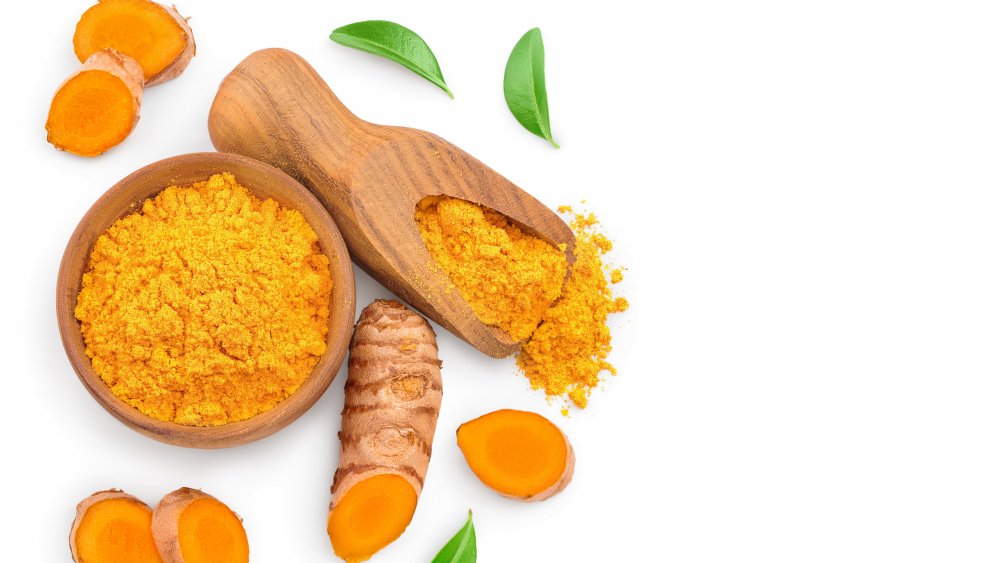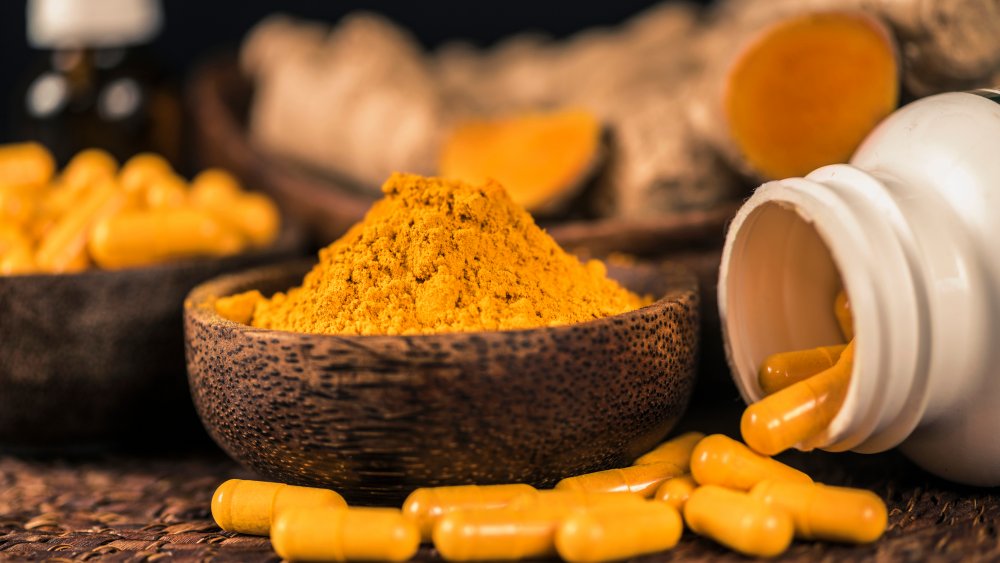Nutritionist Reveals What Happens When You Eat Turmeric Every Day
Is turmeric really the superfood (or super spice) that it's claimed to be? The internet is awash in reports that this amazing substance has near-magical powers to cure just about any condition you can think of, from a sore throat to a pimply face to a low credit score (okay, maybe not that last one). It can be applied externally (Halle Berry puts it in a homemade face mask) as well as ingested in smoothies, chai tea, golden milk, and dishes such as eggs, meats, and curries.
While turmeric does have its health benefits, nutritionist, chef, and food writer Robin Miller cautions that it doesn't necessarily live up to all the hype. While turmeric contains an important antioxidant called curcumin, this substance makes up just 3 to 4 percent of a spice that is used in fairly small quantities, to begin with. What's more, the curcumin found in turmeric is poorly absorbed into the bloodstream. As Miller says, "You'll have to eat a whole lotta curry...to reap any benefits." If you really want turmeric to work its magic, you're better off investing in a good turmeric supplement.
Selecting a turmeric supplement
Miller advises that if you're considering taking supplements of any kind, including turmeric, you'd better consult with your doctor first. Then, she says, "If you get the green light, read labels and choose wisely." What you should be looking for is a supplement that contains 95 percent curcuminoids rather than one that's made from turmeric root powder. Turmeric roots don't contain any more curcumin than the 2 to 4 percent found in the spice jar, so Miller warns, "If only the powder is listed on the label, you're wasting your money." She also supplies the "cool factoid" that your body can absorb curcumin more efficiently when it's combined with black pepper. Black pepper contains a natural substance called piperine that can boost curcumin absorption by 2,000 percent, so definitely look for a supplement that combines pepper with curcuminoids.
As for the proper dosage, Miller says the World Health Organization determined 1.4 mg per pound of body weight as the proper dose, so for a 135-pound person, 189 mg daily would be best. She says that while some studies seem to show that consuming 500+ mg of turmeric per day would be even better, "higher doses of turmeric and curcumin are not recommended long-term since there's little research confirming their safety."
How curcumin can benefit you
Assuming you're able to take in a sufficient amount of turmeric (as will be the case with the proper dose of supplements), then you may start to experience some of the "miracles" it's credited with performing. Well, you're at least likely to enjoy improved health. Miller explains that curcumin "appears to be a strong antioxidant that neutralizes free radicals (which prevents oxidative stress and cell damage in the body)." She also cites studies showing that curcumin may be able to stimulate the production of your body's own antioxidant enzymes, something she says can result in "a greater protective effect."
Miller also tells us of curcumin's powerful anti-inflammatory effect, something she says is "compelling because scientists believe that chronic inflammation plays a major role in many diseases and disorders, including heart disease, cancer, metabolic syndrome, Alzheimer's, arthritis, and several degenerative conditions." So maybe curcumin alone won't be able to cure all ills, but if you consume this supplement on a daily basis, it may prove to be beneficial in a number of ways.
Does turmeric have any downside?
Turmeric supplements aren't for everyone, which is the whole reason behind consulting a doctor instead of just jumping right into any self-dosing regime. Miller notes that turmeric consumed in food isn't likely to be dangerous (nor particularly helpful, either), but says that in supplement form it can present complications under certain circumstances. For one thing, it might interfere with chemotherapy drugs. For another, it can also cause tummy troubles due to the fact that the curcumin it contains helps stimulate the production of gastric acid. While this action can help with digestion and IBS, Miller explains that curcumin "can also cause stomach discomfort when taken in excess" and says that some people experience diarrhea, headaches, nausea, and skin rashes when they ingest even a small amount of turmeric supplement. It is even possible that high doses of curcumin might lead to premature labor and possible miscarriages in pregnant women.
It's not just the curcumin that can be a problematic part of turmeric supplements. The black pepper that helps with absorption can also lead to gastric distress in anyone sensitive to this spice. What's more, cheaper turmeric supplements may contain fillers such as wheat that could trigger allergic reactions. While for the most part, turmeric supplements do more good than harm, you should still do your research to make sure they won't be a problem for you before committing to a jumbo-sized bottle.



